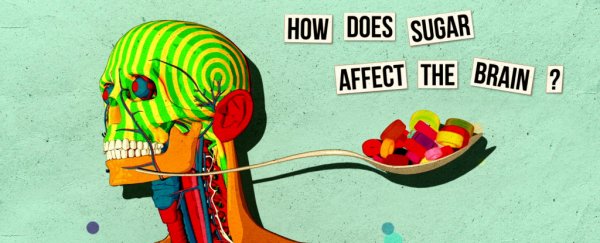
By now, we're all pretty aware that sugar is tucked away in most processed foods, and we also know that we should probably cut back. But what exactly is it about sugar that makes it so addictive? This TED-Ed video breaks down the effect that sugar has on our brains, and finally explains why you get sick of eating the same balanced meal every day for a week but will never get sick of Cheerios.
To start with, we first need to understand what sugar is. Sugars are a class of carbohydrates that are found throughout our common foods and drinks. There are the usual suspects, such as glucose, fructose, and sucrose. But lactose, dextrose, and starch are also all forms of sugar.
So what happens when you have a mouthful of something sugary? As the video explains, the first thing that happens is that the sweet taste receptors on your tongue fire up.
This sends a signal up your brain stem and to the cerebral cortex, which is the region that processes all our tastes. From here, the cerebral cortex signals the brain's reward system through a series of chemical and electrical pathways, to basically answer a single subconscious question for your body: should I do that again?
So when you get that warm, fuzzy, contented feeling after eating a batch of home-made cookies, that's your brain's reward system saying, "Hell yeah!".
Food isn't the only stimulant of this reward system - sex, social contact, and drugs all trigger it. And in small doses that's not a bad thing. But when we have too much sugar, or consume a lot of it over a long period of time, just like drugs, it can kickstart an unfortunate series of events in our brain that lead to cravings, loss of control, and increased tolerance to sugar.
But back to that mouthful of sugar, because it doesn't stop at activating the receptors on your tongue. From there, it travels down into your stomach and gut, where there are also sugar receptors. These send signals to your brain when you're full, and also let your body know if you need to produce more insulin to regulate your blood sugar levels.
One of the main currencies of the reward system is dopamine, a well-known neurotransmitter that spikes when we do things that we enjoy (for example, eat chocolate or have sex) and, if we get too much of it, it can trigger addiction by causing our body to crave more.
Fortunately, sugar doesn't produce dopamine spikes as violently as drugs, but it does have a unique effect. And it's one that explains why you can make an amazing meal on Sunday to eat for the rest of the week, and by Wednesday can't stand the sight of it, but can eat the same sugary snack day after day without getting bored.
Watch the video above to find out more. And, don't worry, eating a piece of cake from time to time isn't a big deal. It's the daily sugar overdoses that we need to be more concerned about.
